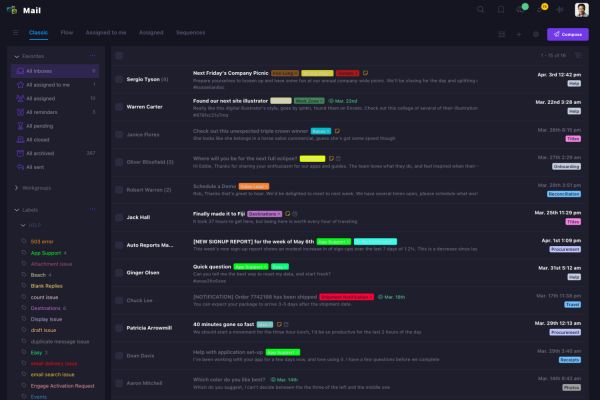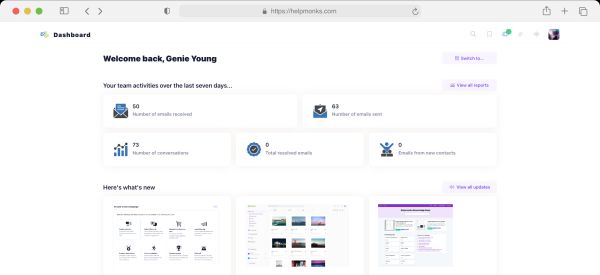
Introducing new pricing for Helpmonks
Discover Helpmonks' new pricing structure, featuring a flexible PRO plan, a FREE plan for smaller teams, and an exciting affiliate program. Experience unparalleled email management solutions today!
Read nowIn today's digital age, building and maintaining strong customer relationships is essential for the success of any business. And one of the most powerful tools at your disposal is email customer relationship management (CRM). Whether you're a seasoned marketer or just starting, mastering email CRM can boost your customer relationships to new heights. With its ability to streamline communication, personalize interactions, and automate processes, email CRM empowers businesses to connect with their customers more meaningfully and effectively.
In this comprehensive guide, we will take you through the ins and outs of email CRM, giving you the knowledge and tools you need to elevate your customer relationships. We'll cover everything from selecting the right CRM platform to crafting compelling email marketing campaigns. You'll learn to segment your audience, create engaging content, leverage automation, and track and analyze your email campaigns for maximum impact. So get ready to take your customer relationships to the next level with the ultimate guide to mastering email CRM.
Establishing and maintaining solid customer relationships is essential for any business's success. Customers' loyalty and trust in a company directly impact its revenue and reputation. Therefore, businesses must prioritize customer relationships and strive to exceed expectations. This approach helps retain existing customers and attracts new ones through positive word-of-mouth recommendations. Investing in customer relationships is a mutually beneficial strategy for the business and its customers.
Building strong customer relationships is crucial for business success. Customers are more likely to stay loyal to a brand that they feel connected to, and email CRM is a powerful tool that can help you foster those connections. With email CRM, you can personalize your communications, tailor your messages to specific audience segments, and provide value that resonates with your customers. By nurturing these relationships, you can increase customer retention, drive repeat purchases, and ultimately, boost your bottom line.
But it's not just about the financial benefits. Strong customer relationships also promote positive word-of-mouth, referrals, and brand advocacy. Satisfied customers are more likely to recommend your products or services to others, expanding your reach and attracting new customers. Additionally, happy customers are more forgiving when mistakes happen and are more likely to give your business a second chance. Investing in customer relationships through email CRM is a long-term strategy that can significantly benefit your business.

To effectively utilize email CRM, it's crucial to know your audience. You can gain valuable knowledge about your customers' preferences, behaviors, and needs by analyzing data and insights. This information will allow you to segment your audience and create targeted email campaigns that resonate with each group.
Start by collecting data on your customers' demographics, purchase history, browsing behavior, and other relevant information. Effective customer engagement strategies can be done through website analytics, CRM software, customer surveys, and social media listening. Once you have this data, you can create customer personas and fictional representations of your ideal customers. These personas will help you understand your audience more deeply and tailor your email CRM strategies accordingly.
Email segmentation is a powerful feature of email CRM that allows you to divide your audience into specific groups based on shared characteristics or behaviors. By sending targeted emails to each segment, you can provide more relevant content and offers, increasing the chances of engagement and conversion. Segmentation can be done based on factors such as demographics, purchase history, engagement levels, or even customer preferences. The more personalized your emails, the more effective your email CRM efforts will be.
Setting up an effective email CRM system is the first step toward boosting customer relationships. There are several key factors to consider when choosing the right CRM platform for your business.
Firstly, you need to determine your specific needs and goals. Are you looking for a CRM platform specializing in email marketing or offering a broader range of features? Consider factors such as ease of use, scalability, integration capabilities, and pricing.
Once you've selected a CRM platform, setting up your account and configuring the necessary settings is the next step. This includes importing your existing contacts, creating custom fields, and setting up email templates. Take the time to familiarize yourself with the platform's interface and features, which will be crucial in effectively managing your customer relationships.
Finally, ensuring that your email CRM system is GDPR-compliant is essential. Familiarize yourself with the regulations and ensure that your CRM platform provides the necessary tools and features to help you stay compliant.

Segmentation and personalization are two essential components of successful email CRM. You can significantly improve engagement and conversion rates by segmenting your audience and delivering personalized content.
Segmentation involves dividing your email list into smaller, more targeted groups based on specific criteria such as demographics, behavior, or purchase history. This allows you to tailor your email campaigns to each segment's unique needs and interests. For example, you can send different offers to new customers versus loyal customers or target customers who have abandoned their shopping carts with a personalized reminder.
Once you have segmented your audience, it's time to create engaging and relevant email content. Your emails should provide value to your customers and encourage them to take action. You achieve this through various emails, such as newsletters, promotional emails, welcome emails, or abandoned cart reminders. The key is to understand the goal of each email and tailor the content accordingly.
Consider each segment's interests and pain points when crafting your email content. Use language and tone that resonates with your audience, and make sure your messages are clear, concise, and compelling. Personalization is vital here - address your customers by name, include dynamic content based on their preferences or past interactions, and make your emails visually appealing with images, videos, or interactive elements.
Personalization goes beyond simply addressing your recipients by their first name. It involves using data and insights to create highly relevant and personalized content. This can include a dynamic range that changes based on the recipient's preferences or past interactions with your brand. Personalization can also extend to the timing and frequency of your emails, ensuring that they are sent at the right time and in the proper context.
It's also important to test and optimize your email content. A/B testing allows you to compare two versions of an email and determine which performs better. Test different subject lines, copy, calls-to-action, or design elements to see what resonates with your audience. Analyze the results and use the data to refine your email content for maximum engagement and conversion.
In addition, make sure your email content is mobile-friendly. With more and more people accessing their emails on mobile devices, your emails must be optimized for a seamless mobile experience. Test your emails on different devices and email clients to ensure they display correctly and are easy to read and navigate.
Automation is a game-changer when it comes to email CRM. By automating specific processes, you can save time, increase efficiency, and deliver personalized experiences at scale. Email automation allows you to trigger emails based on particular actions or events, such as a welcome email when someone signs up for your newsletter, a birthday discount, or a follow-up email after a purchase. Furthermore, it will enable you to nurture leads, onboard new customers, and re-engage inactive subscribers without manual intervention by setting up automated email workflows.
You'll need to choose a CRM platform that offers this functionality to set up email automation. Look for features like email workflows, triggers, and conditions that allow you to create automated email sequences.
The first step in automating your email CRM campaigns is to map out your customer journey. Identify your customers' touchpoints and interactions with your brand and determine the most appropriate emails to send at each stage. For example, you can send a welcome email to new subscribers, a series of educational emails to nurture leads, and a re-engagement campaign to win back inactive subscribers.
Once you have mapped out your customer journey, you can use your CRM platform's automation features to set up triggers and actions. Triggers can be based on specific events or activities, such as a new sign-up or a purchase. Acts can include sending a particular email, assigning a task to a team member, or updating a contact's information.
To ensure the success of your automated email campaigns:

To effectively measure the success of your email CRM campaigns, it is crucial to track and analyze your performance. Tracking your customer engagement metrics will help you understand what's working and what's not and make data-driven decisions to optimize your strategies. Key metrics to track include open rates, click-through rates, conversion rates, unsubscribe rates, and revenue generated.
Most CRM platforms offer built-in analytics and reporting features that allow you to track these metrics. Take advantage of these tools to gain insights into your email performance. Identify patterns, trends, and areas for improvement. For example, if you notice low open rates, you may need to work on your subject lines or sender name. If your click-through rates are low, you may need to improve your email copy or calls-to-action. Use the data to iterate and improve your email CRM campaigns over time.
Tracking and analyzing the performance of your email CRM campaigns is crucial for understanding what works and what doesn't. You can make data-driven decisions and continuously improve your email marketing efforts by monitoring key metrics and analyzing data.
Start by tracking basic metrics such as open rates, click-through rates, and unsubscribe rates. These metrics provide insights into the effectiveness of your subject lines, email content, and overall engagement.
In addition, track conversion rates to measure the success of your email campaigns in driving desired actions, such as purchases or sign-ups. Set up conversion tracking in your CRM platform or integrate it with your website analytics for a holistic view of your customer journey.
Furthermore, adhering to industry best practices is crucial to your email CRM strategy. Below are some helpful tips to keep in mind:
Email CRM is a powerful tool for businesses of all sizes. By mastering email CRM, you can streamline communication, personalize interactions, and automate processes, leading to stronger customer relationships and increased business growth. From understanding your audience and segmenting them effectively to crafting engaging email content and leveraging automation, this guide has given you the knowledge and tools you need to excel in email CRM.
Building strong customer relationships is a long-term strategy requiring continuous effort and refinement. Stay up-to-date with industry trends, monitor your email CRM performance, and always seek ways to improve your process. With dedication and a customer-centric approach, you can take your customer relationships to the next level and drive success for your business.
Now, it's time to put this knowledge into action. Start by assessing your current email CRM practices, identify areas for improvement, and implement the strategies outlined in this guide. Watch as your customer relationships flourish, and your business thrives. Good luck on your journey to mastering email CRM!
If you are looking for an email CRM, give Helpmonks a try. Helpmonks is an all-in-one email management platform that combines shared inboxes, email campaigns, drip emails, live chat, knowledge base, and a powerful email CRM in one.

Discover Helpmonks' new pricing structure, featuring a flexible PRO plan, a FREE plan for smaller teams, and an exciting affiliate program. Experience unparalleled email management solutions today!
Read now
Dynamic email signatures increase brand visibility, build brand identity, and boost conversions. Learn how to create and update dynamic email signatures.
Read now
Looking for an email marketing automation software? This guide shows what to look for. We'll also review the best tools for your online marketing needs.
Read now
Using customer engagement solutions helps you keep your existing customer base and grow. Here are the top 10 customer engagement solutions for your business.
Read now
Empower your team and delight your customers.
